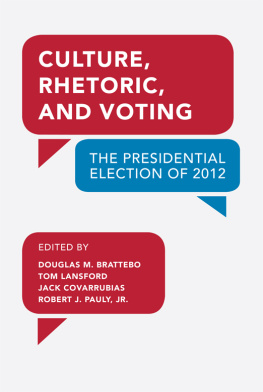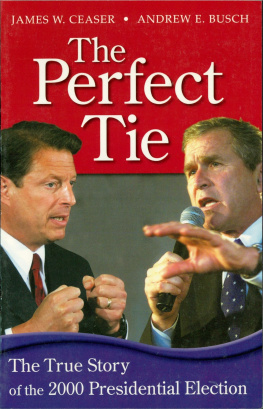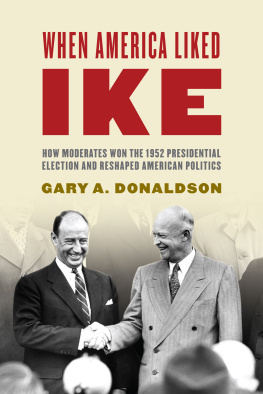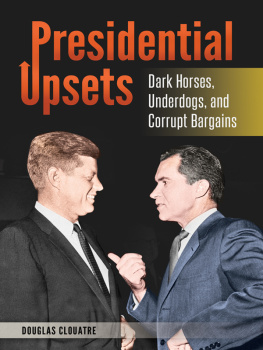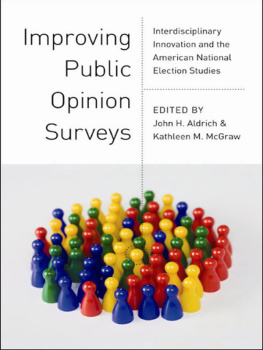CULTURE,
RHETORIC,
AND VOTING
CULTURE,
RHETORIC,
AND VOTING
THE PRESIDENTIAL
ELECTION OF 2012
EDITED BY
DOUGLAS M. BRATTEBO
TOM LANSFORD
JACK COVARRUBIAS
ROBERT J. PAULY, JR.
Copyright 2016 by The University of Akron Press
All rights reserved First Edition 2016 Manufactured in the United States of America
All inquiries and permission requests should be addressed to the Publisher,
The University of Akron Press, Akron, Ohio 44325-1703.
20 19 18 17 16 5 4 3 2 1
LIBRARY OF CONGRESS CATALOGING-IN-PUBLICATION DATA
Names: Brattebo, Douglas M., editor. | Lansford, Tom, editor. | Covarrubias, Jack, editor. | Pauly, Robert J., 1967 editor.
Title: Culture, rhetoric, and voting : the presidential election of 2012 / edited by Douglas M. Brattebo, Tom Lansford, Jack Covarrubias, Robert J. Pauly.
Description: Akron, Ohio : The University of Akron Press, [2015] | Includes bibliographical references and index.
Identifiers: LCCN 2015038212 | ISBN 9781629220383 (paperack : alkaline paper) | ISBN 9781629220406 (epub) | ISBN 9781629220390 (epdf)
Subjects: LCSH: PresidentsUnited StatesElection2012. | VotingUnited States. | Political campaignsUnited States. | Presidential candidatesUnited States. | Obama, Barack. | Romney, Mitt. | ElectionsUnited States. | United StatesPolitics and government2009
Classification: LCC JK526 2012 .C85 2015 | DDC 324.973/0932dc23
LC record available at http://lccn.loc.gov/2015038212
The paper used in this publication meets the minimum requirements of American National Standard for Information SciencesPermanence of Paper for Printed Library Materials, ANSI z39.481984.
Culture, Rhetoric, and Voting was typeset in Goudy with Avenir display by Amy Freels, printed on sixty-pound natural, and bound by BookMasters of Ashland, Ohio.
In memory of James A. Garfield, Twentieth President of the United States
Contents
This book is the product of a conference, The Presidential Election of 2012, held at Hiram College on November 16 and 17, 2012, as the dust was just starting to clear from Election Day (Tuesday, November 6). One hundred and thirty-two years earlier, in November 1880, Hiram College had seen one of its very own elevated to the presidency. James A. Garfieldwho in 1851 commenced two years as a student at what was then the Western Reserve Eclectic Institute, returned to the school in 1856 as an instructor and soon thereafter became its principal, and left the school in 1861 to embark upon a career in the Union Army and in governmentbecame the twentieth president of the United States. Appropriately, the conference participants enjoyed a private tour of the James A. Garfield National Historic Site in nearby Mentor, Ohioan experience that fueled dinner conversation as nearly forty scholars from the United States and Canada enjoyed the music of a string quartet.
The high quality of the scholarly chapters contained in this volume speaks for itself. The editors are enduringly grateful for the creativity, diligence, and patience that each author brought to his or her contribution. Graduate assistant Charlie Carlee provided valuable editorial assistance in assembling the manuscript. The University of Akron Press has been a steady partner on this project, and we have benefited mightily from the wise counsel and good work of Amy Freels, editorial and design coordinator; Carol Slatter, coordinator of print manufacturing and digital production; and director Thomas Bacher. However, neither the conference nor the resulting book would have been possible without the superb efforts of several other estimable people. Brittany Jackson was indefatigable in handling a wide range of planning and logistical challenges associated with the conference. Anita Stocz and Mary Landries ensured that there would be suitable lodging for the participants, that the venues for the panel discussions and meals would be appropriate, and that transportation to and from airports and the historic site would be seamless. Todd Arrington, Chief of Interpretation and Education at the James A. Garfield National Historic Site, and his National Park Service colleagues epitomized professionalism and enthusiasm as they shared their knowledge of the Garfield family and the site with the conference attendees. Keynote speakers Shirley Ann Warshaw, Professor of Political Science at Gettysburg College, and Stephen Koff, Washington Bureau Chief of the Cleveland Plain Dealer, offered up insightful analysis of the Obama presidency and Ohios role in presidential elections, respectively. And the Garfield Institute for Public Leadership provided generous support for the conference, underwriting nearly one-fifth of the conclaves budget.
The conference was a true team effort, so rewarding and productive that we surely will convene another such gathering in the future. Hiram Colleges new James A. Garfield Center for the Study of the American Presidency, whose mission is to cultivate in students a deep understanding of the institution of the presidency and the individuals who have held the office, is certain to be the locus of that effort. We hope President Garfield would be proud.
Douglas M. Brattebo, Hiram College and
Robert J. Pauly, Jr., University of Southern MississippiGulf Coast
When Barack H. Obama was elected in November 2008 and then inaugurated as the forty-fourth president of the United States in January 2009, he broke a significant cultural barrier as the first African American ever to hold that office. In his election campaign in 2008, Obama, then a one-term Illinois senator, was effective in drawing support from voters across a range of cultural, class, ethnic, and age groups in defeating Republican presidential nominee John McCain, a senator from Arizona. However, rather than bring Americans together as he had so confidently promised to do, Obama instead was quickly overcome by a political environment in which divisions grew ever sharper over the course of his first term. The Democratic-Republican divide was punctuated by rhetoric on both sides that often emphasized cultural barriers, whether related to ethnicity, race, religion, socioeconomic status, or, more often, a combination of these factors. Consequently, it is hardly surprising that the outcome of the 2012 presidential electionObamas victory over former Massachusetts governor Mitt Romneywas driven largely by the extent to which each side succeeded in crafting the culturally driven rhetorical messages needed to motivate their respective supporters to cast their ballots in the election.
The interconnected roles of cultural factors, campaign rhetoric, and the resultant voter behavior demand thoughtful analysis from a range of academic disciplinary perspectives. The purpose of this volume is to provide precisely that type of analysis through the collaborative efforts of scholars from several academic disciplines and subdisciplines, including history, communication studies, political science, psychology, religion, and sociology. It is divided into three parts that focus, in turn, on the broad range of cultural aspects of the 2012 presidential election, the rhetorical approaches of the Obama and Romney campaigns during the election, and the ways the voters responded, which, of course, determined the ultimate outcome.
Part One consists of four chapters that focus on matters psychological, spiritual, and cultural. William D. Pederson explores the role of the outsider in American politics and argues that Obama and the other presidents with whom he identifies are outsiders, psychologically, who resolved their outsider origins positively by using the political arena as the domain in which to self-actualize by working on public policy issues. Pederson classifies these presidents as having in common a rational democrat leadership style, which often confounds critics because such presidents build on a rationalist legacy modeled by their heroes rather than offering extremist solutions. Max J. Skidmore examines the political philosophy of Roger Williams (16031683), who was English, an Anglican clergyman, a Puritan, and the founder of Rhode Island (where he also founded Americas first Baptist church). Skidmore contends that the devout Williams, who was his ages most fervent opponent of coercion of conscience and also the figure who laid the groundwork for the traditional American principle of church and state separation, would be appalled at much of 2012s political rhetoric, particularly churches explicit endorsement of purely political initiatives and the setting aside of theological and doctrinal concerns for brazen calculations of worldly self-interest. Luke Perry analyzes Mitt Romneys faith as a unique factor in the 2012 presidential election by examining public perceptions regarding the prospect of a Mormon president and related political dynamics, including the historical record of discrimination against Mormons, comparisons to John F. Kennedys 1960 presidential campaign, the role of evangelical voters in the Republican Party, and the notable barriers to a Mormon becoming president. Perry concludes that discomfort with Mormonism limited Romneys ability to utilize his faith as a means to connect with potential voters. Wrapping up the first section, Graham Dodds looks at the state of cultural politics and the culture wars in the 2012 presidential election cycle. Dodds reviews the history of the topic, considers the impact of four issue areas with a cultural valence (religion and the role of evangelicals, gender and womens issues, gay rights, and aspects of economic and tax policy), and suggests how we might best make sense of the culture wars right now.

